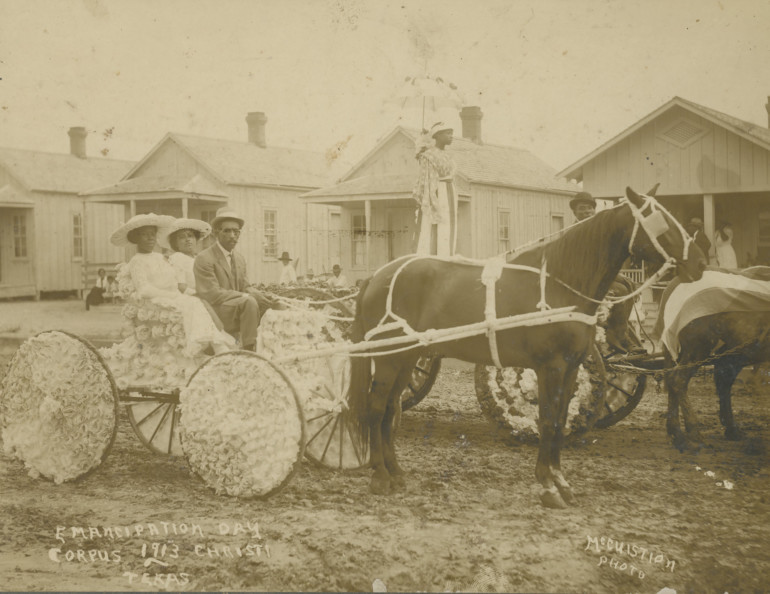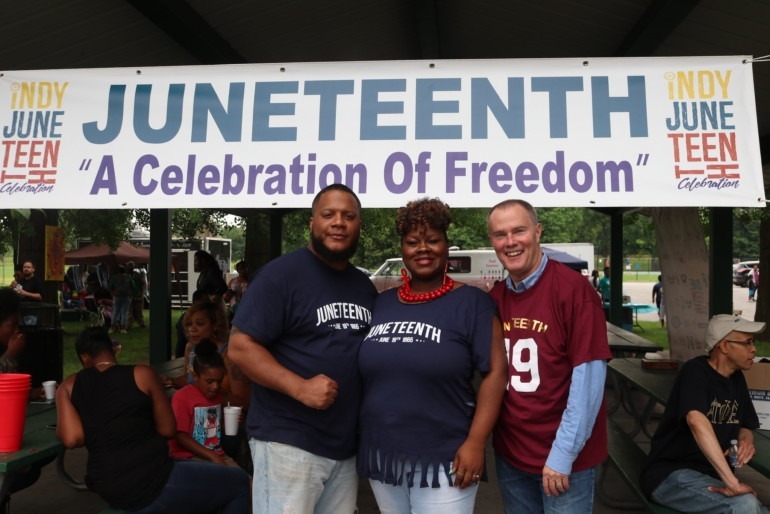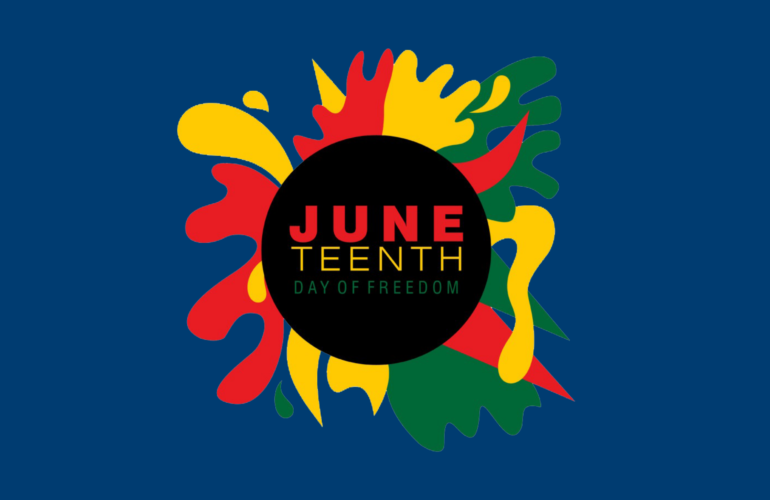The Fourth of July is a nationally recognized and celebrated holiday, commemorating American independence and freedom from Great Britain.
However, this “freedom” was not designed with all in mind. Our nation has spent a considerable time building a society that was meant to uplift some while purposefully excluding many — as proved through systemic, institutional racism that we see everywhere from hospitals to voting booths. In this reality, non-Black Americans are tasked with confronting the deep roots of racism in the United States, and in doing so, it requires us to understand our nation’s troubling, unjust past and present.
Read on for more information on the history behind and continued legacy of Juneteenth, as well as ways to support the Black community in Chicago and nationally all year long.
Origins of Juneteenth

Juneteenth is a nearly 160-year-old holiday celebrating the emancipation of Black individuals who were enslaved in the United States.
It does not honor the signing of the Emancipation Proclamation or the end of the Civil War, as many would think. The Emancipation Proclamation came into effect on January 1, 1863, declaring all enslaved peoples in the Confederacy free — on the condition that the Union won the war. With this single document, barely 700 words in length, the legal status of four million enslaved people in the Confederacy was changed.
But, conditions in the South did not change, and many slave owners withheld this information.
The last battle of the Civil War was fought in 1865, two years after the Emancipation Proclamation was signed. Texas remained a stronghold in the South even after the final battle of the war, and some 250,000 enslaved people were not made aware of their freedom. They only learned of it when Union General Gordon Granger arrived in Galveston, Texas, on June 19, 1865, and announced that President Abraham Lincoln had issued a proclamation freeing them.
Today, there remain varying accounts of why the news of freedom did not reach Texas sooner. It is also important to note that Texas remained a Confederate state until 1865, when Robert E. Lee finally surrendered to the Union Army, so they would not have enforced Lincoln’s proclamation.
On that day, June 19, Granger read aloud General Order, N0. 3: “The people of Texas are informed that, in accordance with a proclamation from the Executive of the United States, all slaves are free. This involves an absolute equality of personal rights and rights of property between former masters and slaves, and the connection heretofore existing between them becomes that between employer and hired labor.”
Granger’s announcement was met with equal parts terror, confusion, and excitement. But, newly freed individuals finally had a day to rally around. They transformed this day of unheeded military orders into their Independence Day.
Most Black people knew that it was not a celebration of victory or triumph — but rather an acknowledgment that change was possible. There was still work to be done. In its 1866 state constitution, Texas refused to ratify the Thirteenth Amendment*, abolishing slavery and involuntary servitude. But, because a two-thirds majority ratified it, it was adopted as federal legislature to the United States Constitution.
* A loophole in the Thirteenth Amendment, allowing incarcerated persons to be subjected to slavery, would continue to be a source of systemic racism affecting Black Americans to this day. Mass incarceration in the United States exploded in the 20th century, essentially once again enslaving millions of people. More about this online, or watch the documentary 13th, by filmmaker Ava DuVernay on Netflix.
As newly freed Texans moved to neighboring states, June 19 — or Juneteenth as it came to be known — celebrations spread across the United States. The celebrations became a space for reassurance, prayer, and the gathering of lost family members. They reread the Emancipation Proclamation, gathered around the barbecue pit to enjoy food delicacies of their culture, played games, and held the occasional rodeo. African American historian Henry Louis Gates Jr. notes that the celebration was used as an occasion “to measure progress against freedom and teach rising generations the values of self-improvement and racial uplift.”
Juneteenth Endures

Early Juneteenth celebrations were a continued reminder of the long road to freedom Black people in America would still need to endure. In some instances, white Southerners forbade Black people from using public spaces for their Juneteenth celebrations. So, they instead gathered near rivers and lakes, eventually raising enough money to buy their own celebration sites. In 1872, the Rev. Jack Yates and a group of fellow formerly enslaved people raised $800 to buy the land to make a yearly space to celebrate Juneteenth, according to the Houston Chronicle. The park was fittingly named Emancipation Park, and it became an official city park in 1918. It is Houston’s oldest park and continues to hold Juneteenth celebrations.
The holiday’s survival was dependent on its move across state lines, brought upon by the Great Migration. In her book, The Warmth of Other Suns: The Epic Story of America’s Great Migration, Isabel Wilerson writes, “The people from Texas took Juneteenth Day to Los Angeles, Oakland, Seattle, and other places they went.”
But, the Smithsonian Magazine writes that “in the bitterness of the Reconstruction and Jim Crow eras, few states of the former Confederacy had any interest in celebrating emancipation. And as many Black people migrated north, especially in the Depression era, Juneteenth became a largely forgotten vestige of the Civil War era.”
It was the tumultuous events of the ’60s that brought Juneteenth back into focus. After Martin Luther King Jr. was assassinated on April 4, 1968, Rev. Ralph Abernathy promised to fulfill his Poor People’s March, a campaign meant to address the employment and housing problems of the poor throughout the United States. The March fell short of its goals, and organizers decided to cut it short, instead holding a Juneteenth celebration. William Wiggins Jr., a professor Emeritus of Folklore at Indiana University, explained in an interview with Smithsonian Magazine that his theory is that delegates from the march took the idea of celebrating Juneteenth back to their respective communities. After that summer, instances of Juneteenth started popping up in newspapers around the country. But, until recently, Juneteenth was still not widely recognized outside the Black community and is even still largely ignored in school curricula.
Juneteenth Today
In 1980, Texas became the first state to recognize June 19 as a state holiday, although the state’s government offices still do not close for the day. Fast forward to recent years, on June 16, 2021, Illinois Governor JB Pritzker signed a bill declaring Juneteenth a state holiday. For each year that Juneteenth falls on a weekday, the holiday will be a paid day off for all state workers and public education professionals. On the national level, President Biden signed a bill on June 17, 2021, that establishes Juneteenth as a federally recognized holiday.
Now, Juneteenth celebrations take place across the country. Organizations such as the Smithsonian Institution and the Henry Ford Museum have begun sponsoring Juneteenth-centered activities, with the mission to promote and cultivate knowledge and appreciation for Black history and culture.
Today, celebrations are still centered around the same traditions: religious services, storytelling, music, food, and honoring Black culture. The New York Times also published an article about Juneteenth food traditions, pointing to the inclusion of red foods as “crimson symbol[s] of ingenuity and resilience in bondage.” Some celebrations are more spiritual and intimate, used as a day of meditation and multicultural prayer.
The holiday is also a reminder of the work that still needs to be done to achieve racial equality in America and of the life-threatening issues, such as police brutality and mass incarceration, that continue to plague Black communities. In a nation reckoning around systemic oppression in the United States, it is crucial to understand the 400 years that have led to it.
How to Honor and Support the Black Community This Juneteenth and Beyond
For non-Black folks wanting to support the Black community this Juneteenth, the most impactful actions you can take are to educate yourself, grapple with the ways white privilege has functioned in your own life, and commit to lifelong anti-racist practices.
Support organizations committed to supporting Black communities, uplifiting Black history and culture, and protecting the rights and civil liberties of all people, including: My Block, My Hood, My City, the NAACP, the National Museum of African American History & Culture, and the ACLU.
Assata Shakur said, “It is our duty to fight for our freedom. It is our duty to win. We must love each other and support each other. We have nothing to lose but our chains.”
To learn more about Juneteenth, check out this Juneteenth reading list as well as Haymarket Books in Chicago. The official Juneteenth website also offers ways to honor the day.
In Chicago, there are countless Black-owned eateries to support. Check out these 10 Black-Owned Restaurants — some of which participate in Juneteenth festivities — to enjoy a great meal while supporting members of the Black community. Make an effort to shop Black-owned businesses and the Thank You Chicago Juneteenth Market held in West Chicago.
Get to know more about Chicago’s rich history in neighborhoods like Bronzeville, which was a hub of innovation and success in the early days of Chicago, thanks to the many Black residents of that area and all over Chicago. Check out Chicago Mahogany Tours — guided by internet sensation and Chicago historian Shermann “Dilla” Thomas.
More from Better:
- You Said It: When Cultural Appreciation Crosses the Line into Appropriation
- You Said It: I’m an Economist — Here’s Why DEI in Business, Education and Community Leads to Economic Prosperity
- The Employees Are Not Alright — How We Can Revitalize a Weary Workforce

